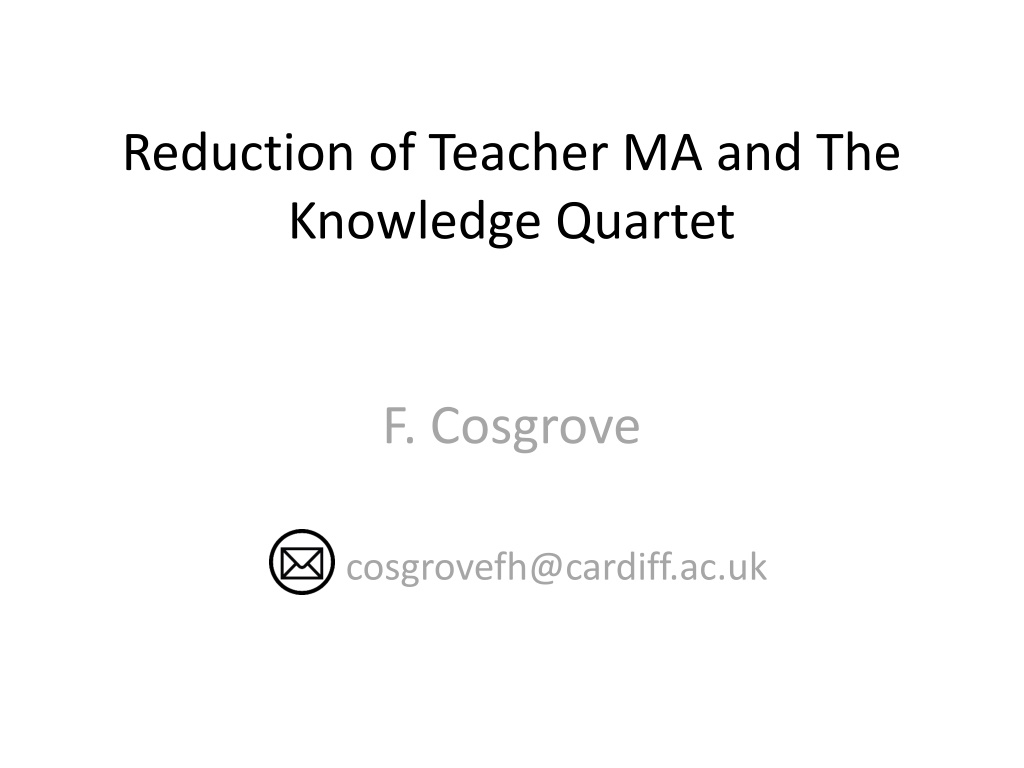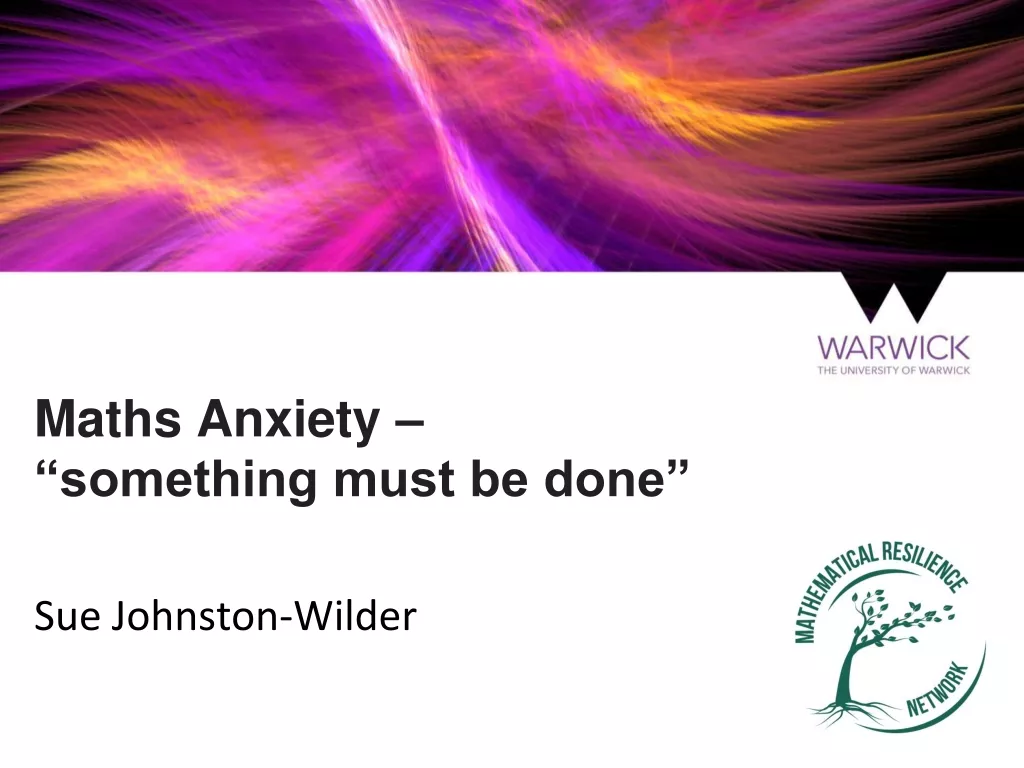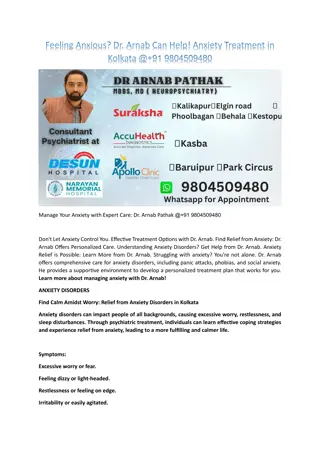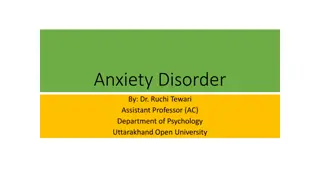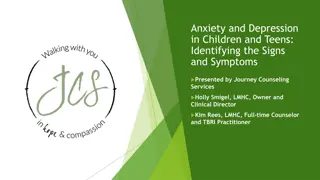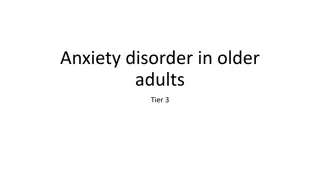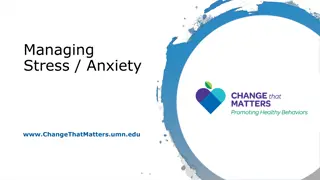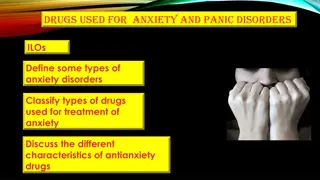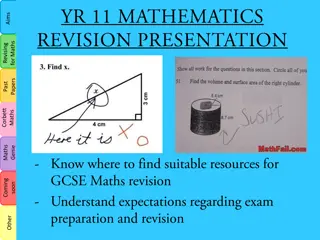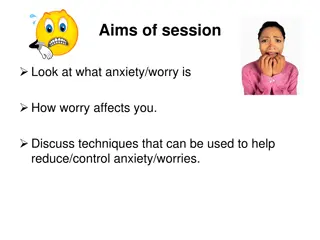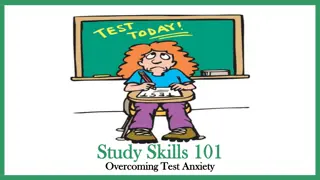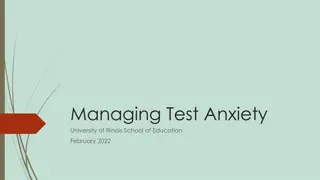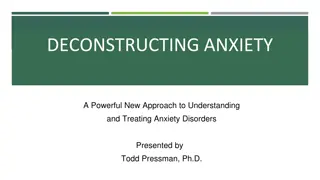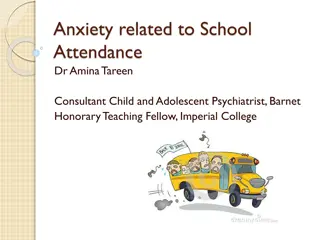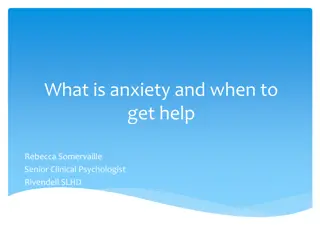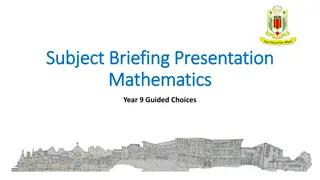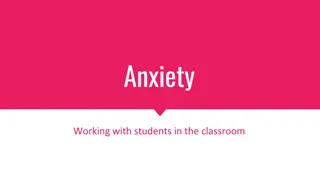Exploring Teacher Professional Development and Maths Anxiety
This collection of images and descriptions explores the reduction of Teacher MA, the Knowledge Quartet framework, the impact of teacher MA on pupil outcomes, the importance of addressing maths anxiety in both male and female students, and various measures and interventions for professional development in teaching math. The resource delves into the significance of self-efficacy for math, general self-efficacy, and qualitative measures like drawing oneself doing math and conducting interviews and reflections. It also outlines an intervention process for teachers to enhance their teaching practices through self-reflection and collaboration.
Download Presentation

Please find below an Image/Link to download the presentation.
The content on the website is provided AS IS for your information and personal use only. It may not be sold, licensed, or shared on other websites without obtaining consent from the author. Download presentation by click this link. If you encounter any issues during the download, it is possible that the publisher has removed the file from their server.
E N D
Presentation Transcript
Reduction of Teacher MA and The Knowledge Quartet F. Cosgrove cosgrovefh@cardiff.ac.uk
Overview of Research Design & Findings Introduction to the Knowledge Quartet Examples Questions
Maths Anxiety feelings of tension and anxiety that interfere with the manipulation of numbers and the solving of mathematical problems in ordinary and academic situations (Richardson and Suinn, 1972, p.551).
Why does teacher MA matter? Beilock et al. (2010) Teacher MA predicts outcomes for female pupils to a statistically significant (if small) degree. 17 female primary teachers and their 117 pupils Schaeffer et al. (2020) Findings support the idea that teachers maths anxiety is one factor that undermines the learning of both male and female pupils. 40 primary teachers and their 551 pupils
A Moment to Breathe . Word Cloud representing the most used words in teachers reflections
Teacher Professional Development The Knowledge Quartet: Rowland et al (2005)
Quantitative Measures (pre and post) Self Efficacy for Maths General Self Efficacy Maths Anxiety Bandura (Ohio State University, 2017) Hopko et al. (2003) Rushton et al. (2016)
Qualitative Measures Draw yourself doing maths (pre and post) Semi structured interviews (pre and post) Teacher and researcher critical incident notes Teaching episode recordings Joint reflection recordings
Intervention 1. 2. 3. 4. 5. 6. Record yourself teaching Watch the recording and select short critical incidents, reflect on them Record the timestamp, the KQ code and a comment Include strengths and opportunities for development Meet your partner and discuss your incidents and theirs Repeat steps 1-5 until you have completed four cycles
Findings Participant 3 After Before
Findings Participant 2 Before After
Findings Participant 1 Before After
Conclusion & Limitations While more research is needed to determine when, how and for whom such an approach might be effective, it seems to be possible to reduce teacher MA using relatively modest, but carefully designed, interventions (Cosgrove, 2021).
Proceedings & Blog Reducing mathematics anxiety in primary school teachers through collaborative reflection using the knowledge quartet. https://bsrlm.org.uk/wp-content/uploads/2018/10/BSRLM-CP-38-2- 05.pdf Blog Post: https://www.bera.ac.uk/blog/a-moment-to-breathe-how-reflection-can-reduce- teacher-maths-anxiety
References Beilock, S.L., Gunderson, E.A., Ramirez, G. and Levine, S.C. 2010. Female teachers math anxiety affects girls math achievement. Proceedings of the National Academy of Sciences, 107(5), pp.1860-1863. Hopko, D.R., Mahadevan, R., Bare, R.L. & Hunt, M.K. 2003. The abbreviated math anxiety scale (AMAS) construction, validity, and reliability. Assessment, 10(2), pp.178-182. Ohio State University,. 2017. Bandura s Instrument: Teacher Self-efficacy Scale. (Online) Available at https://cpb-us-w2.wpmucdn.com/u.osu.edu/dist/2/5604/files/2014/09/Bandura-Instr- 1sdm5sg.pdf Rushton, S.J., Hadley, K.M. & Stewart, P.W., 2016. Mathematics Fluency and Teaching Self- efficacy of Teacher Candidates. Journal of the International Society for Teacher Education, 20(2). Schaeffer, M.W., Rozek, C.S., Maloney, E.A., Berkowitz, T., Levine, S.C. and Beilock, S.L. 2021. Elementary school teachers' math anxiety and students' math learning: A large scale replication. Developmental science, 24(4), p.e13080.
The Knowledge Quartet: Rowland et al (2005) Book: Rowland, T. (2009). Developing primary mathematics teaching: Reflecting on practice with the knowledge quartet (Vol. 1). Sage. Website: http://www.knowledgequartet.org
In the beginning ... Lee Shulman (1987) Generic Knowledge Knowledge of pedagogy, learners, educational contexts, educational purposes and values Content Knowledge ( The Missing Paradigm ) subject matter knowledge (SMK) product and process; pedagogical content knowledge (PCK) - includes forms of representation of concepts, useful analogies, examples, demonstrations; curriculum knowledge - materials and programmes.
Motivation for the KQ Question: How can teacher educators and school-based mentors be assisted in giving more attention to mathematical content?
Using a Grounded Theory Approach Began in 2002 and continues to present Video 24 lessons taught by 12 trainee primary teachers on final practicum placement. Team of 5 researchers Focus on the teacher s mathematics content knowledge (not just general pedagogical issues).
Tips KQ is designed to be used to reflect on maths. Video yourself (don t work from memory). Select short critical incidents (use a timecode). Choose your own focus, don t let a mentor dictate it to you. Discuss it/review the incident with a trusted mentor or peer.
in observing and commenting on someone else teaching, the supportive observer stands to learn as much, or more, as the one being observed. (Rowland et al, 2009)
References Glaser, Barney G & Strauss, Anselm L., 1967. The Discovery of Grounded Theory: Strategies for Qualitative Research, Chicago, Aldine Publishing Company Rowland, T. (2009). Developing primary mathematics teaching: Reflecting on practice with the knowledge quartet (Vol. 1). Sage. Shulman, L. S. 1986. Those who understand: knowledge growth in teaching . Educational Researcher 15(2), pp 4-14. Shulman, L. S. 1987. Knowledge and teaching: Foundations of the new reform. Harvard Educational Review, 57(1), pp. 1-22
